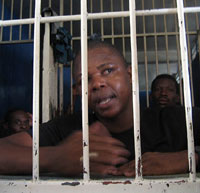DominionSections
Browse Articles
- IndependentMedia.ca
- MostlyWater.org
- Seven Oaks
- BASICS Newsletter
- Siafu
- Briarpatch Magazine
- The Leveller
- Groundwire
- Redwire Magazine
- Canadian Dimension
- CKDU News Collective
- Common Ground
- Shunpiking Magazine
- The Real News
- Our Times
- À babord !
- Blackfly Magazine
- Guerilla News Network
- The Other Side
- The Sunday Independent
- Vive le Canada
- Elements
- ACTivist Magazine
- The Tyee
- TML Daily
- New Socialist
- Relay (Socialist Project)
- Socialist Worker
- Socialist Action
- Rabble.ca
- Straight Goods
- Alternatives Journal
- This Magazine
- Dialogue Magazine
- Orato
- Rebel Youth
- NB Media Co-op
Radio
Haitians Ask Canada: What Security?
July 21, 2004
Haitians Ask Canada: What Security?
 Under Canadian and US supervision, thousands of civil servants have been jailed on vague or nonexistent charges. Former police chief Jean Michel Gaspard, shown here, was released by US Marines after he demanded basic information about why he was being held.
Under Canadian and US supervision, thousands of civil servants have been jailed on vague or nonexistent charges. Former police chief Jean Michel Gaspard, shown here, was released by US Marines after he demanded basic information about why he was being held. Prime Minister Paul Martin and Foreign Affairs Minister Bill Graham announced that 100 RCMP officers will be sent to Haiti, as part of a plan to "ensure security and stability." The officers, according to Martin, will help to "reform the Haitian National Police."
The announcement has left many Haitians puzzled as to what the Canadian government means by "security and stability." Since the democratically elected President Jean Bertrand Aristide and his Lavalas party were removed from power, all 5,000 members of the Haitian National Police have been dismissed from their positions and replaced by members of the former military. The Haitian military, often supplied and trained by the US, was integral to several coups and attempted coups until it was disbanded by Aristide in 1994.
Since Canadian and American troops landed in Haiti in February, between 2,000 and 3,000 Haitians, mostly Lavalas activists who support the return of Aristide, have been murdered. Demonstrations in favour of Aristide's return have been met with gunfire, and dozens have been killed. Many members of the former government are in hiding. In at least one case, US forces were involved in a massacre in the Bel Aire district of Port-au-Prince. The role of Canadian troops is less clear, but a report in the Truro Daily News confirmed that Canadian snipers are working in the Haitian countryside. Master Cpl. Scott Richardson, a Canadian sniper who worked in Haiti, was quoted as saying "we're the ones who fly around in the helicopters, drop into the mountains looking for the baddies ... it's a cool job."
When Aristide was removed, Haiti's prisons were emptied of convicted murderers, war criminals, and drug dealers, and have now been filled with Lavalas party activists. Many have not been charged; some, fearing assassination, have turned themselves in.
--Anthony Fenton
Related articles:
By the same author:
Archived Site
The Dominion is a monthly paper published by an incipient network of independent journalists in Canada. It aims to provide accurate, critical coverage that is accountable to its readers and the subjects it tackles. Taking its name from Canada's official status as both a colony and a colonial force, the Dominion examines politics, culture and daily life with a view to understanding the exercise of power.